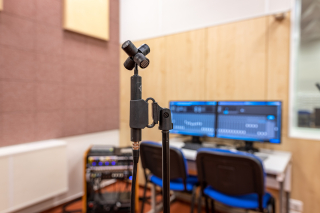The present of the department ...
The Department of Telecommunications is a modern educational and research workplace with top experts and up to date equipped laboratories. At present, it is the largest institute at the faculty, both in terms of the number of employees and the number of students. It provides teaching of three study programs, which are focused on telecommunications, mobile communications and networks, data networks, security in IT against cyber threats, digital signal processing, artificial intelligence, and image and audio data processing. The high level of study is ensured by constantly modernized equipment, in which, among other things, participate leading companies in the field of data networks and communications, by high qualification growth of employees and good cooperation with experts from practice who participate in selected lectures on modern trends in communication technologies.
Research activities are focused primarily on cyber security, high-speed communication networks, 5G networks, IoT, Industry 4.0, Smart Grids, Smart Home and signal processing, especially speech, early diagnosis of diseases, and security of critical infrastructure. Our staff, doctoral students and students are part of top teams composed of academics and practitioners. In cooperation with our partners, we solve dozens of national and multinational projects, especially in applied research.
... and its history
The first mention of teaching in the field of telecommunications systems dates back to the establishment of the Faculty of Electrical Engineering in 1959. The branch of Communication Technology was established, later called Electronics and Communication Technology. The institute gradually developed and the graduates found employment mainly in the then state-owned company providing, as the only one, telecommunications services. The mass development of the institute took place especially after 1990, when a completely new stage of development began. The institute develops cooperation with foreign universities and succeeds in acquiring the most modern world technology. The professional focus is expanding and, in addition to traditional telecommunications, it is now focusing on computer networks, data communications, high-speed networks, etc. Naturally, there is a convergence of telecommunications and computer technologies. Scientific research activities are beginning to be of considerable importance. Gradually, the study programs Telecommunication and Information Systems, Telecommunication and Information Technology, Audio Engineering and Information Security were created.









